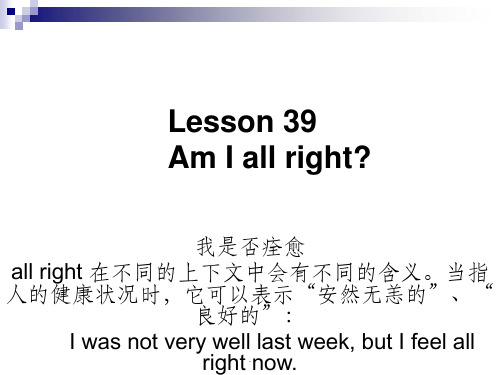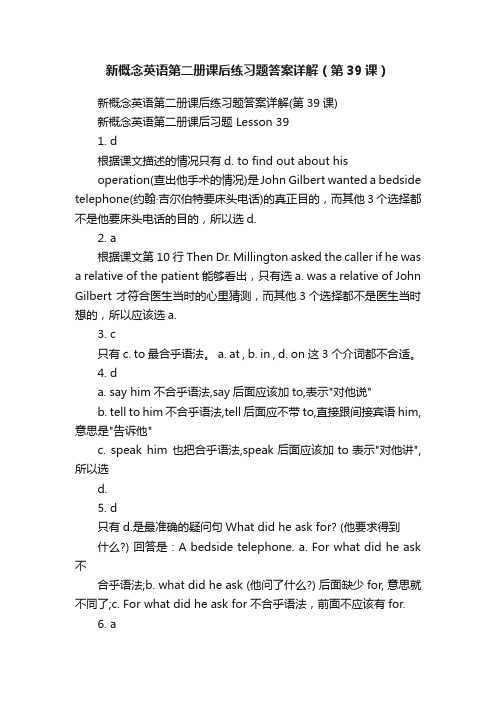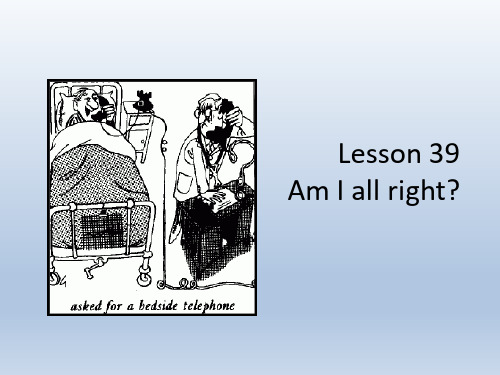新概念二39课
新概念英语第二册39课

1、人称的转变
1)直接引语中的第一人称随主句主语变 如: He said,“I am very sorry.” ——>He said that he was very sorry. 2)直接引语中的第二人称随主句谓语变 如: “You should be more careful next time,” my father told me. ——> My father told me that I should be more careful the next time.
2、时态的转换 直接引语改为间接引语时,主句中的谓语动词 如果是过去时,从句(即间接引语部分)的谓语动词在时态方 面要作相应的变化,变成过去时范畴的各种时态(实际也是宾 语从句的时态要求),变化如下:
直接引语 间接引语 一般现在时 一般过去时 一般过去时 过去完成时 现在进行时 过去进行时 现在完成时 过去完成时 过去完成时 过去完成时 过去进行时 过去进行时 一般将来时 过去将来时
3)地点状语:here变成there She said, “I won't come here any more.” ——> She said that she wouldn’t go there any more. 4)动词:come变成go,bring变成take 5、直接引语变间接引语,句子结构的变化 1)陈述句。用连词that引导,that在口语中常省略。主 句的谓语动词可直用接引语中的said, 也可用told来代替, 注意,可以说said that, said to sb. that, told sb. that, 不可直接说told that,
如: He asked me, “Will you go to the station with me to meet a friend of mine this afternoon?”
新概念第二册第39课.

• relative亲戚
• Call up your old friends and relativ es.
• 打电话给你的老朋友和亲戚
•You go first and I will follow .
.
•patient n. 病人/ adj.有耐心的 •patiently adv. 耐心地,忍耐地 •patience n. 耐心 He’s a very ______p_a_ti-emnatn . •Mr. scott stood _______p_a_ti_e_n_talyt the bus stop. • The job needs of__________.
Lesson 39 Am I all right?
我是否痊愈 all right 在不同的上下文中会有不同的含义。当指 人的健康状况时,它可以表示“安然无恙的”、“
良好的”: I was not very well last week, but I feel all
right .now.
How are you today?
She went home alone. 她独自回家去了。
After his wife died, he lived alone.
• 他的妻子死后,他一个人生活。
• She lives alone ,but she doesn't feel lonely.
• He was alone in the house.
手术就会高兴了
•operation room 手术室 •do/perform an operation on sb.
给某人做手术
operate [ˈɒpəreɪt] v. 手术 (on sb.)
新概念英语第二册Lesson39AmIallright?(课文详解练习)讲义

新概念英语第二册Lesson 39Am I all right? 我是否痊愈?While John Gilbert was in hospital, he asked his doctor to tell him whether his operation had been successful, but the doctor refused to do so. The following day, the patient asked for a bedside telephone. When he was alone, he telephoned the hospital exchange and asked for Doctor Millington. When the doctor answered the phone, Mr. Gilbert said he was inquiring about a certain patient, a Mr. John Gilbert. He asked if Mr. Gilberts operation had been successful and the doctor told him that it had been. He then asked when Mr. Gilbert would be allowed to go home and the doctor told him that he would have to stay in hosptial for another two weeks. Then Dr. Millington asked the caller if he was a relative of the patient. No, the【课文翻译】While John Gilbert was in hospital, he asked his doctor to tell him whether his operation had been successful, but the doctor refused to do so. 当约翰.吉尔伯特住院的时候,他问医生他的手术是否成功,但医生拒绝告诉他The following day, the patient asked for a bedside telephone. 第二天,这位病人要了一部床头电话。
新概念英语第二册 课后答案 第三十九课

新概念英语第二册课后答案第三十九课新概念英语第二册课后答案第三十九课 Lesson 391. d根据课文描述的情况只有d. to find out about hisoperation(查出他手术的情况)是John Gilbert wanted a bedside telephone(约翰·吉尔伯特要床头电话)的真正目的,而其他3个选择都不是他要床头电话的目的,所以选d.2. a根据课文第10行Then Dr. Millington asked the caller if he was a relative of the patient 能够看出,只有选a. was a relative of John Gilbert 才符合医生当时的心里猜测,而其他3个选择都不是医生当时想的,所以应该选a.3. c只有c. to 最合乎语法。
a. at , b. in , d. on 这3个介词都不合适。
4. da. say him不合乎语法,say后面应该加to,表示"对他说"b. tell to him 不合乎语法,tell后面应不带to,直接跟间接宾语him,意思是"告诉他"c. speak him 也把合乎语法,speak后面应该加to表示"对他讲",所以选d.5. d只有d.是最准确的疑问句What did he ask for? (他要求得到什么?) 回答是:A bedside telephone. a. For what did he ask 不合乎语法;b. what did he ask (他问了什么?) 后面缺少for, 意思就不同了;c. For what did he ask for 不合乎语法,前面不应该有for.6. a只有选a. let him go(让他走)才能同前一句When will he be allowed to go home(他什么时候能够回家。
新概念英语第二册课后练习题答案详解(第39课)

新概念英语第二册课后练习题答案详解(第39课)新概念英语第二册课后练习题答案详解(第39课)新概念英语第二册课后习题 Lesson 391. d根据课文描述的情况只有d. to find out about hisoperation(查出他手术的情况)是John Gilbert wanted a bedside telephone(约翰·吉尔伯特要床头电话)的真正目的,而其他3个选择都不是他要床头电话的目的,所以选d.2. a根据课文第10行Then Dr. Millington asked the caller if he was a relative of the patient 能够看出,只有选a. was a relative of John Gilbert 才符合医生当时的心里猜测,而其他3个选择都不是医生当时想的,所以应该选a.3. c只有c. to 最合乎语法。
a. at , b. in , d. on 这3个介词都不合适。
4. da. say him不合乎语法,say后面应该加to,表示"对他说"b. tell to him 不合乎语法,tell后面应不带to,直接跟间接宾语him,意思是"告诉他"c. speak him 也把合乎语法,speak后面应该加to表示"对他讲",所以选d.5. d只有d.是最准确的疑问句What did he ask for? (他要求得到什么?) 回答是:A bedside telephone. a. For what did he ask 不合乎语法;b. what did he ask (他问了什么?) 后面缺少for, 意思就不同了;c. For what did he ask for 不合乎语法,前面不应该有for.6. a只有选a. let him go(让他走)才能同前一句When will he be allowed to go home(他什么时候能够回家。
新概念英语第二册第39课

7.Inquire
enquire v.打听,询问;调查,查问 inquire about inquire into
8.certain
adj.确实的 It is certain that they will agree. 某某的,某人的 For some certain reasons , I won't attend it. certainly adv. 确定,无疑 Centainly ,you are wrong. 当然,行 May I use your telephone?
3.succeed v.成功 ~in doing sth He succeeded in passing the exam. success n.成功 What•is the secret of your success? Confidence is the key to success. n.(c) 成功的人或事 The party was a big success. successful adj.成功的 a successful actor
2.耐心的 patient with sb\sth. n. 病人;患者 patience n.耐心,毅力 Teaching children needs patience.
5.alone
adj. 单独的;独自的 by oneself= on one's own adv. 单独地,独自地;唯一,只,仅仅 feel lonely
Welcome to my class!
2014-9-25
Lesson 39 Am I All Right ?
have a fever
have a headache stomachache
新概念英语第二册Lesson 39 (PDF版课件 )

New words and expressions
• In exchange, you teach me how to clean.
GRAMMAR
Grammar
• 定义:当一个句子作宾语时,这个句子就 叫做宾语从句。
• 179 • 180页
Grammar
• 用法:在谓语动词、介词、动词不定式等 后面都可以接宾语从句。
Comprehension questions
• The doctor refused to, didn't he? • Yes, he did.
Comprehension questions
• What did the patient ask for the following day?
• For a bedside telephone.
• in hospital • 住院
Text
• The following day, the patient asked for a bedside telephone.
• asked for 请求,索要
Text
• He asked me for a meal and a glass of beer. • NCE2 Lesson6
operation n.
• the process of cutting into someone’s body to repair or remove a part that is damaged
• 手术
New words and expressions
• operation on • She’s going to need an operation on her ankle.
新概念2第39课

TEXT WORD GRAMMAR
operation
n. 1. [外科]手术 —— operate v.做手术 Phrases:
do operation on sb.给某人做手术
successful n. 成功的,一帆风顺的
—— success n. 成功succeed v. 成功
'Have you ever been abroad?'Catherine asked.——Catherine asked if/whether I had ever been abroad.(现在完成变过去完成)
'Why didn't you write to me?'Jane asked.— —Jane asked why I hadn't written to her.( 一般过去变过去完成)
1、人称的转变
1)直接引语中的第一人称一般与说话人一致。
如: He said,“I am very sorry.”
——>He said that he was very sorry.
2)直接引语中的第二人称转换为与听话人一致。
如: “You should be more careful next time,” my father told me. ——> My father told me that I should be more careful the next time.
• 5. He asked if Mr. Gilbert’s operation had been successful and the doctor told him that it had been. 这里也是一般疑问句的间接引语,所以 使用了if作为引导词。
